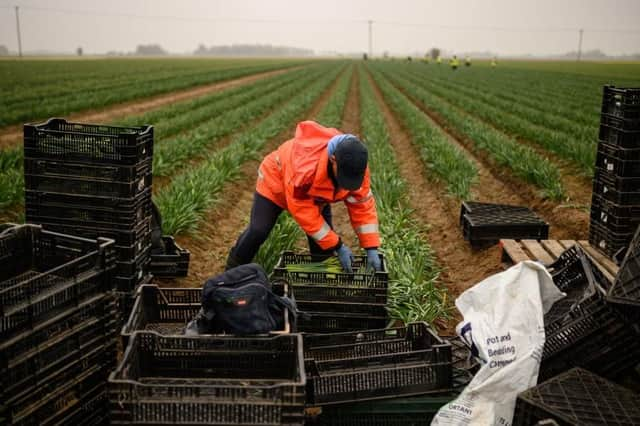Report warns labour shortages due to Brexit and the pandemic threaten Lincolnshire's agriculture sector


Farms are struggling to recruit European workers who they traditionally relied on due to the impact of Brexit and the pandemic.
The Scrutiny Panel report on Agriculture Sector Supports in Lincolnshire, said farms, businesses, and communities across Lincolnshire are all grappling with the impact of labour shortages, posing significant challenges to the local economy and the agricultural sector.
Advertisement
Hide AdAdvertisement
Hide AdThe scarcity of workers in the county has also raised concerns about the future of farming and various industries that heavily rely on a robust workforce.
The report, due before Lincolnshire County Council’s Environment and Economy Committee on Tuesday, said the county’s agriculture sector faces significant labour shortages, leading to disruptions in the supply chain and potential financial losses for farmers.
The report warns: “If the labour shortage is not resolved swiftly, shortages threaten to shrink the sector permanently with a chain reaction of wage rises and price increases reducing competitiveness, leading to food production being exported abroad and increased imports.”
The report highlights that a shortage of skilled workers in the agricultural industry has become a pressing issue, with various factors contributing to the problem.
Advertisement
Hide AdAdvertisement
Hide AdOne of the key reasons behind the labour shortages is the decline in migrant workers coming to Lincolnshire.
“For the past two decades, the main source of labour came from foreign countries,” said the report.
However, recent changes in migration patterns and policies, as well as the impact of Brexit, have led to a decline in the availability of migrant labour.
The report also notes there is an ageing workforce in Lincolnshire’s agricultural sector with many long-term workers nearing retirement age, and a shortage of younger individuals interested in pursuing careers in agriculture.
Advertisement
Hide AdAdvertisement
Hide AdFurthermore, the report said the COVID-19 pandemic exacerbated the labour shortage with restrictions on international travel, quarantines, and health concerns all making it difficult to recruit workers from overseas.
The pandemic has disrupted the flow of seasonal workers, who play a crucial role in the agricultural sector, particularly during peak harvest periods.
The report notes that some of the unmet demand has been met by a rise in robotics, but substantial investment will be needed for automation to be a major part of the industry.
“With an estimated 500,000 worker shortfall in the UK agri-food sector (more if migration was to cease), the investment needed is tens of billion pounds,” it said.
Advertisement
Hide AdAdvertisement
Hide AdThe impact of labour shortages extends beyond agriculture, affecting various industries such as hospitality, construction, and healthcare.
Local businesses are struggling to find qualified and skilled workers, which has hampered their operations and growth potential.
To address the challenges, the report notes Lincolnshire County Council and local stakeholders are exploring initiatives to attract and retain workers.
Efforts include partnering with educational institutions to promote agricultural careers, providing training and apprenticeship opportunities, and raising awareness about the importance of the industry to the local economy.
Advertisement
Hide AdAdvertisement
Hide AdThe county plans to lobby MPs, the Home Office and DEFRA (Department for Environment, Food and Rural Affairs), calling on them to make it easier for farms to import labour for longer, while promoting new automation technologies over the next 10 to15 years.
Further support is being offered to Trading Standards, and a Championing Farmed Environment scheme could be reinstated.
The council will also look to improve mental health among farmers and create a green masterplan for the county in order to balance the need for renewable energies and net zero targets to be met.